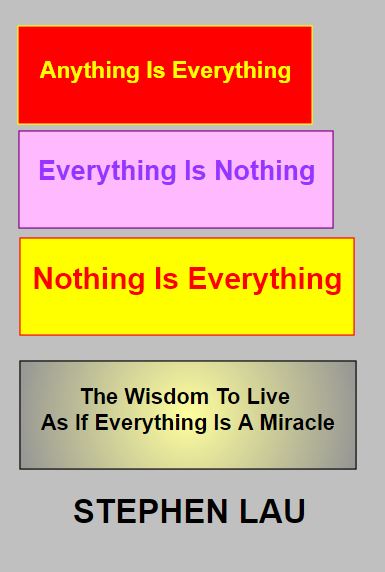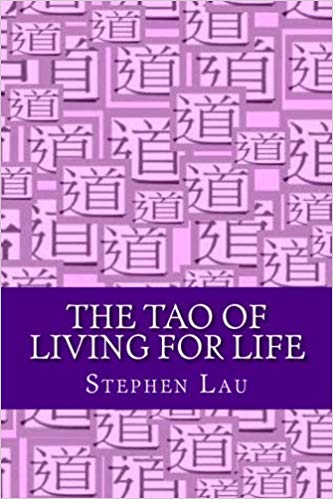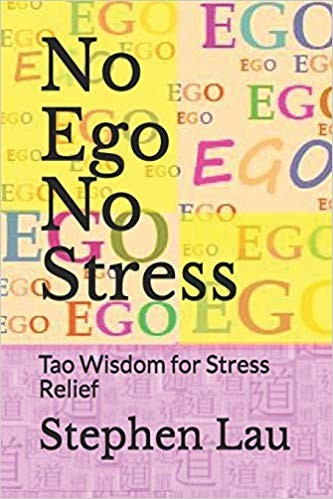
Nothing Is Everything
by
Stephen Lau
by
Stephen Lau




This most recently published book is about the miracle of living.
“Anything” may be “everything” to you, but not to others, and vice-versa. That may explain the some of the difficulties in human relationships. Life is difficult because it is all about you, and not about others. Let go of “anything is everything” to you if you focus more on others as well.
“Everything is nothing” is a universal truth: nothing lasts, no matter how we wish they were permanent. Many of us are reluctant to accept this universal truth of the impermanence of all things in this world.
“Nothing is everything” is enlightenment of the human mind, which is profound understanding of the ultimate truths of self, of others, and of the world around.
This 100-page book explains with many real-life examples to illustrate the perceptions of “anything is everything”, “everything is nothing”, and “nothing is everything”--based on the ancient Chinese wisdom of Lao Tzu, the ancient sage from China more than 2,600 years ago, and the Biblical wisdom.
Get this profound wisdom to live your life as if everything is a miracle.
Knowing and understanding the truths of anything and everything may enlighten you so that you can intuit the ultimate truth that everything is actually nothing, but this nothingness is paradoxically your only pathway to everything in your life.
Click here to get your book.
“Anything” may be “everything” to you, but not to others, and vice-versa. That may explain the some of the difficulties in human relationships. Life is difficult because it is all about you, and not about others. Let go of “anything is everything” to you if you focus more on others as well.
“Everything is nothing” is a universal truth: nothing lasts, no matter how we wish they were permanent. Many of us are reluctant to accept this universal truth of the impermanence of all things in this world.
“Nothing is everything” is enlightenment of the human mind, which is profound understanding of the ultimate truths of self, of others, and of the world around.
This 100-page book explains with many real-life examples to illustrate the perceptions of “anything is everything”, “everything is nothing”, and “nothing is everything”--based on the ancient Chinese wisdom of Lao Tzu, the ancient sage from China more than 2,600 years ago, and the Biblical wisdom.
Get this profound wisdom to live your life as if everything is a miracle.
Knowing and understanding the truths of anything and everything may enlighten you so that you can intuit the ultimate truth that everything is actually nothing, but this nothingness is paradoxically your only pathway to everything in your life.
Click here to get your book.
"Nothing Is Everything" Is Enlightenment
Enlightenment is an endless process of knowing and understanding anything and everything that is simply there and is available to all since the beginning of time. It is like knowing that at sunrise you will see sunlight as long as you open your eyes; its presence is permanent-but you just have to open your eyes to see its presence, and even the blind can just feel the presence of the sunlight.
Li Ching-Yuan, a Chinese herbalist, martial artist, and tactical advisor, known for his extreme longevity of well over 200 years-which far exceeded the longest confirmed lifespan of 122 years of a French woman-gave his profound wisdom on enlightenment:
Before I had studied Zen for thirty years,
I saw mountains as mountains,
and waters as waters.
When I arrived with a more intimate knowledge,
I saw that mountains are not mountains,
and waters are not waters.
But now that I have got its very substance,
I am at rest.
For it is just that I see mountains once again as mountains, and waters once again as waters.
(Li Ching-Yuan)
Enlightenment is effortless and spontaneous. So, if you strive to know and understand anything and everything, the enlightenment may never come. But that does not matter because you may already have the wisdom to see that “mountains are not mountains, and waters are not waters.”
The truth of the matter is that your mental capability to see “mountains once again as mountains, and waters once again as waters”-which is the enlightenment itself-may or may not come to you now or even for the rest of your life. Enlightenment may still be important to you, but not that important. After all, many of us may all pass through life with some wisdom but without really attaining our self-enlightenment. Having said that, it is important that at least you see “mountains are not mountains, and waters are not waters”-which is already profound human wisdom.
Yes, illusion and delusion may go on indefinitely, but enlightenment may take only a moment. It is the very moment of consciousness without being self-conscious.
The realization that nothing is in fact everything gives you freedom and liberation from all your previous attachments. Letting go to let God is self-enlightenment. Returning to dust is actually the only pathway to everything; physical death is just a way station on the road to eternity, and that nothingness ultimately becomes everything in the life to come.
Stephen Lau
Copyright© by Stephen Lau
Enlightenment is an endless process of knowing and understanding anything and everything that is simply there and is available to all since the beginning of time. It is like knowing that at sunrise you will see sunlight as long as you open your eyes; its presence is permanent-but you just have to open your eyes to see its presence, and even the blind can just feel the presence of the sunlight.
Li Ching-Yuan, a Chinese herbalist, martial artist, and tactical advisor, known for his extreme longevity of well over 200 years-which far exceeded the longest confirmed lifespan of 122 years of a French woman-gave his profound wisdom on enlightenment:
Before I had studied Zen for thirty years,
I saw mountains as mountains,
and waters as waters.
When I arrived with a more intimate knowledge,
I saw that mountains are not mountains,
and waters are not waters.
But now that I have got its very substance,
I am at rest.
For it is just that I see mountains once again as mountains, and waters once again as waters.
(Li Ching-Yuan)
Enlightenment is effortless and spontaneous. So, if you strive to know and understand anything and everything, the enlightenment may never come. But that does not matter because you may already have the wisdom to see that “mountains are not mountains, and waters are not waters.”
The truth of the matter is that your mental capability to see “mountains once again as mountains, and waters once again as waters”-which is the enlightenment itself-may or may not come to you now or even for the rest of your life. Enlightenment may still be important to you, but not that important. After all, many of us may all pass through life with some wisdom but without really attaining our self-enlightenment. Having said that, it is important that at least you see “mountains are not mountains, and waters are not waters”-which is already profound human wisdom.
Yes, illusion and delusion may go on indefinitely, but enlightenment may take only a moment. It is the very moment of consciousness without being self-conscious.
The realization that nothing is in fact everything gives you freedom and liberation from all your previous attachments. Letting go to let God is self-enlightenment. Returning to dust is actually the only pathway to everything; physical death is just a way station on the road to eternity, and that nothingness ultimately becomes everything in the life to come.
Stephen Lau
Copyright© by Stephen Lau
Double click to edit

“Nothingness” Is the Pathway to “Enlightenment”
Enlightenment has its origin from emptiness. Irrespective of whether or not attaining self-enlightenment, emptiness is the way to go toward attaining profound wisdom of living in this material world.
Emptiness is a way of human perception: looking at life experiences without adding anything to them, or without taking away anything from them. It is the thinking of the mind with no assumption and no presumption-that is, only an empty mindset.
Emptiness can be either positive or negative (the glass half-full, or the glass half-empty). Positive emptiness can only occur when you allow yourself to surrender completely to any given circumstance or situation without any previous attachment.
According to Lao Tzu, develop an empty mindset, which is more than just “thinking out of the box”: it is your reverse thinking to create your own empty box of thinking.
An empty mind with no craving and no expectation helps us letting go.
Being in the world and not of the world, we attain heavenly grace.
With heavenly grace, we become pure and selfless.
And everything just settles into its own perfect place.
(Lao Tzu, Tao Te Ching, chapter 3)
An illustration
There was the story of a professor visiting a Zen master to find out more about Zen, which is an Eastern philosophy. In the beginning of the visit, the professor kept on talking, while the Zen master served him tea. At some point, the Zen master kept pouring tea into the teacup held by the professor even though it was brimming over. The moral of the story is that you must have an empty mind before you can accept new and unconventional ideas. Likewise, to intuit true human wisdom, you must have an empty mind capable of reverse thinking to find out the ultimate truths of anything and everything.
An empty mindset frees you from the many shackles of life that may have enslaved you and kept you in bondage without your knowing it. To be the master of your own life, you must have complete control over your own thinking mind, which must be empty without any pre-conditioned thoughts.
How do you gain control of your life in terms of your career, human relationships, time management, and daily stress, and among many others? First and foremost, you must empty your pre-programmed mind of any beliefs, blueprints, and roadmaps that tell you to do this or not to do that.
To illustrate, in your subconscious mind, you must set goals; to reach your goals, you must exert efforts; after accomplishing one goal, you need to set another higher goal, and yet another one higher than the previous ones; in addition, you must also have a role model to follow. But to take complete control of your life, you must empty your mind of all these pre-conditioned thoughts that are no more than your own attachments in the material world.
When there is abundance,
there is lacking.
When there is craving,
there is discontentment.
Striving for power to control and influence every aspect of our lives
is the source of our sufferings.
Obsessed with getting and keeping,
many of us never really live before we die.
Following the Way,
we must learn to let go of everything.
(Lao Tzu, Tao Te Ching, chapter 75)
Life is always complex, and contemporary living is complicated with its many emotional and material clutters and attachments. To live well, you must learn to let go of anything and everything. The desire for simplicity may accelerate the process of letting go as life progresses. An empty mind with reverse thinking may help you let go of all your attachments in the complex and complicated material world you are living in.
Stephen Lau
Copyright© by Stephen Lau
Enlightenment has its origin from emptiness. Irrespective of whether or not attaining self-enlightenment, emptiness is the way to go toward attaining profound wisdom of living in this material world.
Emptiness is a way of human perception: looking at life experiences without adding anything to them, or without taking away anything from them. It is the thinking of the mind with no assumption and no presumption-that is, only an empty mindset.
Emptiness can be either positive or negative (the glass half-full, or the glass half-empty). Positive emptiness can only occur when you allow yourself to surrender completely to any given circumstance or situation without any previous attachment.
According to Lao Tzu, develop an empty mindset, which is more than just “thinking out of the box”: it is your reverse thinking to create your own empty box of thinking.
An empty mind with no craving and no expectation helps us letting go.
Being in the world and not of the world, we attain heavenly grace.
With heavenly grace, we become pure and selfless.
And everything just settles into its own perfect place.
(Lao Tzu, Tao Te Ching, chapter 3)
An illustration
There was the story of a professor visiting a Zen master to find out more about Zen, which is an Eastern philosophy. In the beginning of the visit, the professor kept on talking, while the Zen master served him tea. At some point, the Zen master kept pouring tea into the teacup held by the professor even though it was brimming over. The moral of the story is that you must have an empty mind before you can accept new and unconventional ideas. Likewise, to intuit true human wisdom, you must have an empty mind capable of reverse thinking to find out the ultimate truths of anything and everything.
An empty mindset frees you from the many shackles of life that may have enslaved you and kept you in bondage without your knowing it. To be the master of your own life, you must have complete control over your own thinking mind, which must be empty without any pre-conditioned thoughts.
How do you gain control of your life in terms of your career, human relationships, time management, and daily stress, and among many others? First and foremost, you must empty your pre-programmed mind of any beliefs, blueprints, and roadmaps that tell you to do this or not to do that.
To illustrate, in your subconscious mind, you must set goals; to reach your goals, you must exert efforts; after accomplishing one goal, you need to set another higher goal, and yet another one higher than the previous ones; in addition, you must also have a role model to follow. But to take complete control of your life, you must empty your mind of all these pre-conditioned thoughts that are no more than your own attachments in the material world.
When there is abundance,
there is lacking.
When there is craving,
there is discontentment.
Striving for power to control and influence every aspect of our lives
is the source of our sufferings.
Obsessed with getting and keeping,
many of us never really live before we die.
Following the Way,
we must learn to let go of everything.
(Lao Tzu, Tao Te Ching, chapter 75)
Life is always complex, and contemporary living is complicated with its many emotional and material clutters and attachments. To live well, you must learn to let go of anything and everything. The desire for simplicity may accelerate the process of letting go as life progresses. An empty mind with reverse thinking may help you let go of all your attachments in the complex and complicated material world you are living in.
Stephen Lau
Copyright© by Stephen Lau


